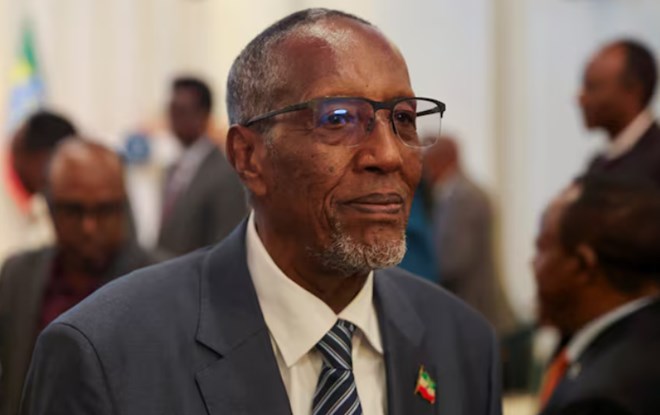
By Abdi Sheikh and Sonia Rao
Wednesday November 13, 2024

Somaliland President Muse Bihi Abdi arrives at the signing ceremony of the Memorandum of Understanding agreement with Ethiopia's Prime Minister Abiy Ahmed, that allows Ethiopia to use a Somaliland port, in Addis Ababa, Ethiopia, January 1, 2024. REUTERS/Tiksa Neger/File Photo Purchase Licensing Rights
Voters in Somaliland flocked to the polls on Wednesday to choose a president at a time when the breakaway Somali region sees international recognition within reach after three decades of de facto self-rule.
Somaliland, which occupies a strategic location at the juncture of the Indian Ocean and Red Sea, declared independence from the Mogadishu government in 1991.
It has not been recognised by any country, restricting access to international finance and the ability of its six million people to travel.The Hargeisa government is hoping to soon finalise a preliminary deal signed in January with landlocked Ethiopia that would grant Addis Ababa a strip of land on the coast in exchange for diplomatic recognition.
Hargeisa is also hopeful U.S. President-elect Donald Trump will be favourable to its cause.
President Muse Bihi Abdi, in power since 2017, is standing for re-election against the main opposition party's candidate, Abdirahman Cirro. The vote was originally scheduled for 2022, but lawmakers opted to extend Bihi's term by two years.
"We pray to Allah to make the election take place democratically and peacefully and as usual a peaceful transfer of power in peace," Bihi told reporters after casting his vote.
Video footage broadcast by state-owned television showed voters lined up in towns across the region waiting their turn to cast their ballots.
The presidential candidates differ on domestic issues, but both have expressed support for the pact with Ethiopia. Mohamed A. Mohamoud, Somaliland's representative to Kenya, told reporters that the government would finalise the deal after the election, regardless of who wins.
The agreement has soured Mogadishu's relations with Addis Ababa, which is a major contributor to a peacekeeping force in Somalia fighting against Islamist militants there, and drawn Somalia closer to Ethiopia's historic rivals, Egypt and Eritrea.
Somaliland is also optimistic that the incoming Trump administration will revisit Washington's longstanding recognition of Mogadishu's sovereignty over Somaliland.
Several leading State Department officials who worked on Africa policy during Trump's first term have publicly voiced support for recognising Somaliland.
"We are hopeful that the new administration will defy some of the (traditional) American policy," Mohamoud said.
Mohamoud said the competitive, multi-party election was proof of Somaliland's democratic credentials. Somaliland has mostly enjoyed peace since achieving autonomy in 1991, just as Somalia plunged into a civil war from which it has yet to emerge.
Reporting and writing by Sonia Rao; Additional reporting by Abdi Sheikh in Mogadishu; Editing by Aaron Ross and Alex Richardson